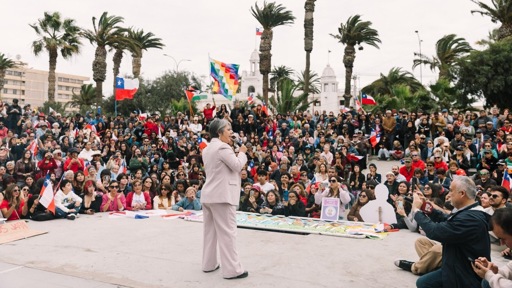On November 16, Chileans will go to the polls to elect the future president of the South American nation. After four years of the center-left administration of Gabriel Boric, Chileans will have to choose between continuing this trend (which includes several parties on the left, the center-left, and various social movements of different kinds), or making a shift to the far right.
On the left-wing coalition side is Jeannette Jara, a member of the Communist Party of Chile and former minister of Social Security (2022-2025) under the Boric administration. Jara has announced that, despite the party she belongs to, her administration will be moderate and will continue with Boric’s social policies, while attempting to expand on others.
According to several polls, Jara is in first place in voting intentions in an election that, after several elections, will be compulsory for those eligible to exercise their right to vote. The polling firm Plaza Pública Cadem claims that Jara has 30% of the vote, which has come as a surprise to many. However, that projection for Jara would be insufficient for her to win the presidency in the first round, so, according to the polls, she would have to face the second most voted candidate in a runoff. This scenario is precisely what worries the Chilean left the most.
In fact, although the right wing has lost its lead in the polls, this is not because it has low support, but because, according to pollsters, its vote has been divided among three candidates who have garnered significant support from the population.
Close behind Jara is the far-right José Antonio Kast, ran in the last elections and lost to Boric. Kast has 15% of the vote, while the Centro de Estudios Públicos poll puts him in a technical tie with Jara (23%).
Although Kast was presented as the strongest candidate on the right, in recent weeks he has been losing some support to the two candidates behind him. One of them is the far-right deputy and YouTuber Johannes Kaiser, from the National Libertarian Party, whom many see as the “Chilean Milei” and who has run a less traditional political campaign but one that has had a greater impact on young people on the right. This has earned him the apparent support of 13% of voters.
Not far behind is Evelyn Matthei, representative of Chile’s traditional right wing and former labor minister under right-wing president Sebastián Piñeira, who served in that position twice (2010-2014, 2019-2022). According to Plaza de Pública Cadem, Matthei, who is running for the Independent Democratic Union, has 12% of the vote.
Is Chile’s political fate already decided?
In this scenario, several journalists have mentioned that the first round of the Chilean elections would function as a kind of primary for the Chilean right. Thus, the Chilean right wing is not disappointed by the poll numbers, as they assume that the right-wing vote would tend to unite behind the candidate who makes it to the second round. Thus, the combined votes of Kast, Kaiser, and Matthiei (almost 49% of the votes) would be enough for a change of direction in the administration of La Moneda, the presidential palace.
For her part, if Jara manages to make it to the runoff, she will have to try to win over not only the more moderate right-wing voters (which will depend largely on who the right-wing candidate is in the second round), but also the voters of the other candidates, who, according to several polls, do not exceed 5% of the vote: Eduardo Artes, of the Communist Party Proletarian Action (1%), and Marco Enríquez-Ominami, an independent candidate (1%).
Read More: Jeannette Jara wins left-wing primary in Chile, surges to second in polls
The other two candidates, Franco Parisi of the People’s Party, with an apparent voting intention of 5%, and Harold Mayne-Nicholls, with 1%, may be more attracted to a possible right-wing government than to the alliances that Jara could offer.
However, it would be premature to assume what will happen in a second round when the first round has not yet taken place.
Lucía Dammert, professor in the Department of Political Studies at the University of Santiago, Chile warns: “It’s not that the left won’t make it to the second round, despite all the dire predictions that have been made, but once again, I think we can’t stop being surprised or expecting surprises, given what has happened in Latin America in recent years, in almost every election, so until the last vote is counted, all we can say are hypotheses and not realities.”
It is also important to note that votes are not automatically transferred to another candidate. The right-wing candidate who makes it to the runoff will have to find a way to gain support from the other candidates. The traditional right, grouped around Matthei, finds itself somewhat displaced by the rise of the new right, which has managed to capitalize on the discontent that the traditional right-wing administrations have failed to address.
The complex legacy of the dictatorship
Likewise, the legacy of Augusto Pinochet’s bloody dictatorship (1973-1990), supported by the United States and the driving force behind one of the world’s first neoliberal states (thanks to the advice of the famous Chicago Boys), has left a wound that history has yet to heal.
A large part of the country supports the actions of a dictatorship that declared itself anti-communist, meaning that Jara’s political party (despite her having shown herself closer to the center-left than to the revolutionary left) is viewed with fear by many.
On the other hand, the fact that candidates such as Kast and Kaiser have publicly stated that they admire or respect Pinochet’s actions revives a series of ghosts left behind by a dictatorship that murdered, disappeared, and/or tortured nearly 10,000 people.
The post Chile heads to the first round of presidential elections appeared first on Peoples Dispatch.
From Peoples Dispatch via this RSS feed


